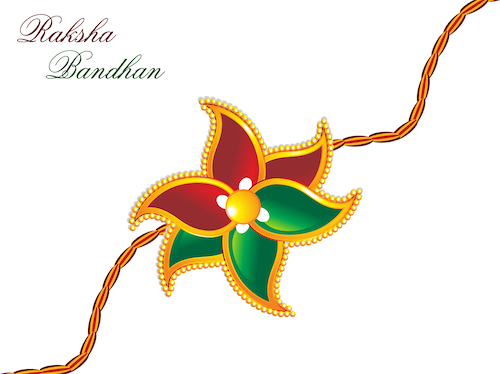Contribute
| The Thin But Strong Thread Of Raksha: Raksha Bandhan |
Press Release
08/02/2022
Raksha Bandhan is the Day of the Sisters, and Brothers, mostly. It is celebrated almost all over India, the West coast, the Gujarat region, the Central region, and also on the East coast. This is one day when a strong familial bond is experienced to the full, with general amiability, and, of course, sweets and sumptuous meals. Raksha or a Security Thread is tied by sisters of all ages on the right wrists of their brothers. A vermilion tika is also applied on the foreheads of brothers, and a piece of sweet is fed after tying of the Rakhi. The symbolic Rakhi is supposed to protect the brothers from all harm and, in extension, return as protection and care of the sisters by the brothers. It is a silent promise of ‘being there’ for each other. While Hindi films have popularized the festival, stretching the limits of the brothers’ promise melodramatically, mythological stories of the occasions of tying a Rakhi or Raksha thread tell us that such a protective thread was tied by mainly the Brahmins or the religious gurus after the threads were consecrated. There is a story of Krishna advising Yudhisthir to have such a sacred thread tied during the Mahabharata war. There is another story of the King Indra’s wife Indrani tying such a protective thread on the arm of her husband going to the battlefield. A Gujarati folk song has Kunta, the mother of the Pandavas, tying such a protective thread on the arm of her grandson Abhimanyu before he went in to face the seven layered war plan (Kunta Abhimanyu ne bandhe amar Rakhdi). Stories also abound in any woman tying or sending a Rakhi to any man, asking protection. And history has stories where the man actually would feel obligated to protect the woman, be it Mughal emperor Humayun who came to the rescue of Queen Karnavati, or Krishna who came to the rescue of Draupadi facing public humiliation. While Rakhi can be tied by any woman to any man, a more dedicated day of brothers and sisters follows about two months later after Diwali and the New Year, the day of Bhai Duj or Bhaiya Duj. This is a day when the brother visits the sister in her home and she does an ‘arati’ praying for his well-being, and then follows a meal with kheer. Whatever the symbolic meaning behind the Raksha bandhan, the fun part of it for all sisters has always been the return gift the brother has to give to the sister. Some sisters prefer a gift of money, and have a field day as they go on tying Rakhis to brothers, cousins, and even neighbors, and taking home a really sizeable amount. The lunches or the dinners are another joyful family occasions. However, in today’s times, a lot of people have come to have a ‘rushed’ Rakhi or a ‘displaced for convenience’ Rakhi on another day. No matter how ritualistically boring it might have become, the day still is a reminder of the ties of affection, the ties of family, and the feelings of inclusion and togetherness.
You may also access this article through our web-site http://www.lokvani.com/
